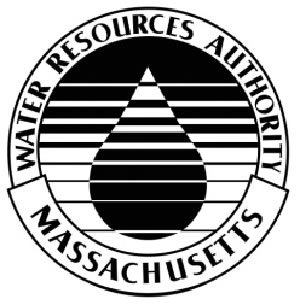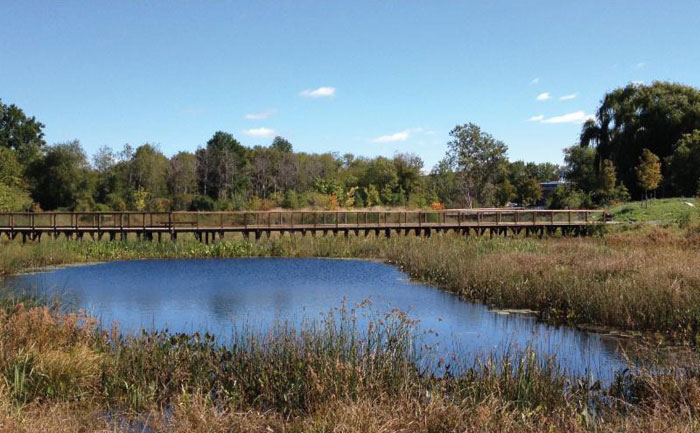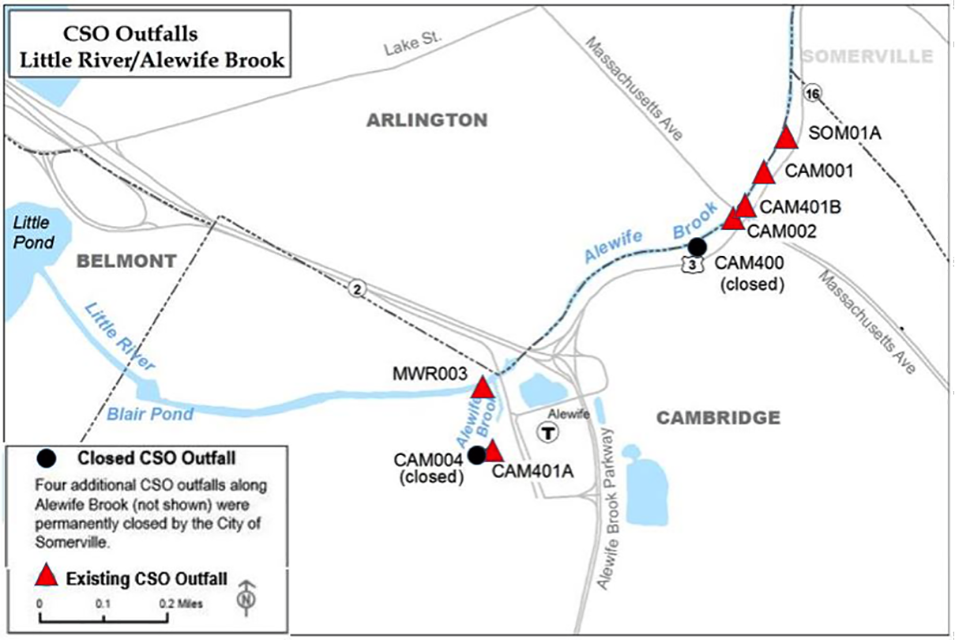This notice is required by the Massachusetts Department of Environmental Protection (DEP) as an annual update on the progress of Combined Sewer Overflow (CSO) control measures to improve the water quality of Alewife Brook. This notice is for residents whose property lies within the extended 100-year floodplain of Alewife Brook as established and currently in effect by the Federal Emergency Management Agency (FEMA).
The water quality in Alewife Brook is often impaired due to bacterial and other pollutants from a number of sources, including CSOs, cross connections between sanitary sewers and storm drains, and stormwater runoff. Water quality in the Alewife Brook during both wet and dry weather generally fails to meet state bacteria standards for fishing and swimming. Contaminant sources originate in the watershed communities of Belmont, Arlington, Cambridge and Somerville, all of which are undertaking programs to identify and control sources of pollution to the Alewife Brook.
Portions of Cambridge and Somerville are served by combined stormwater and sanitary sewer systems common in older cities. Six CSO outfalls on Alewife Brook (see the map below) can release CSOs (a mixture of wastewater and stormwater) during heavy rainfall to provide critical relief to the sewer system when flows exceed system capacity. While these discharges can contribute to impairment of water quality, they are necessary to prevent sewer backups into homes, businesses and streets.
CSOs and contaminants that can get into separate stormwater pipes can include bacteria and other pathogens, oxygen-demanding pollutants, solids and other contaminants. Because of increased health risks associated with these contaminated discharges, public health officials recommend avoiding contact with the Alewife Brook during storm events and for a period of 48 hours following rain storms, as there may be increased health risks during these periods. Contact with floodwaters should also be avoided as they may contain similar contaminants and pose associated health risks. Proper precautions are necessary to minimize these risks during flooding events. DEP has developed guidance for homeowners for responding to flooding onto your property from large storms or sewer backups, which can be found at: https://www.mass.gov/guides/flooding-and-sewage-back-ups-home-care-guide
As part of the nearly 35-year old Federal District Court Order in the Boston Harbor Case (D. Mass. C.A. No. 85-0489-RGS), the Massachusetts Water Resources Authority (MWRA) is required to undertake certain corrective actions to reduce or eliminate CSO discharges to Boston Harbor, the Mystic, Charles and Neponset rivers and Alewife Brook. MWRA and its communities with permitted CSO outfalls, including Boston, Cambridge, Chelsea and Somerville, have been reducing CSO discharges continuously since the 1980s. Major improvements to the regional wastewater collection and treatment system by MWRA and local system improvements by the communities, including the separation of combined sewers with construction of new storm drain systems, have contributed to the closing of many CSO outfalls and an 88% reduction in the total annual volume of CSO discharge region-wide.
In December 2015, MWRA, in partnership with its CSO communities, completed the last of the 35 projects in the Long-Term CSO Control Plan approved by the U.S. Environmental Protection Agency (EPA) and DEP and mandated in the federal court order. Seven of the 35 projects have contributed to the control of CSO discharges to the Alewife Brook. Together, the seven projects have closed six CSO outfalls (half of the outfalls that were active in the late 1980’s) and are predicted to reduce average annual CSO volume to the Alewife Brook by 85% and reduce the frequency of CSO discharges at the most active outfall from 63 activations a year to seven activations a year. Remaining CSO discharges are predicted to comply with Class B “fishable/swimmable” water quality standards 98% of the time.
For more information about the Long-Term CSO Control Plan, the projects and their CSO control benefits, and water quality conditions and improvement, see MWRA’s final CSO Annual Progress Report, filed with the Federal Court in March 2016.
Attainment of the Court-mandated Levels of CSO Control
Since its CSO program began in the mid-1980s, MWRA has effectively met more than 180 federal court schedule milestones related to CSO control. The last two milestones require MWRA to commence a 3-year CSO post-construction monitoring program and performance assessment by January 2018 and submit a related report to EPA and DEP by December 2020 intended to verify that remaining CSO discharges meet the levels of control in the approved Long-Term Control Plan and court order. On November 8, 2017, MWRA issued the Notice to Proceed with a contract for post-construction monitoring and performance assessments in advance of and in compliance with the January 2018 milestone. The contract includes CSO inspections, overflow metering, hydraulic modeling, system performance assessments and water quality compliance assessments, which will be documented in the report to EPA and DEP in December 2020. MWRA will also post information and progress updates on its CSO webpage, linked below.
Water Quality Standards Variance for Alewife Brook and Upper Mystic River
Since 2000, DEP has issued a series of variances to water quality standards that allow CSO discharges to Alewife Brook and the Upper Mystic River pending completion and verification of MWRA’s Long-Term Control Plan. On August 31, 2016, DEP extended the variance to August 31, 2019. The variance extension and a supporting fact sheet can be found at: http://www.mass.gov/eea/agencies/massdep/water/wastewater/final-determinations-for-cso-variances.html. The variance includes conditions requiring MWRA to conduct certain water quality sampling, CSO reporting and proper sewer system operation and maintenance to minimize CSO discharges and their impacts. The current variance extension requires MWRA to submit a modified (enhanced) water quality monitoring program by December 2016 and a scope of work for the 3-year post-construction monitoring program and CSO performance assessment by May 1, 2017. MWRA met both requirements and continues to conduct its water quality monitoring program, as modified.
It is anticipated that DEP will reissue the variance through 2020, after which it intends to make long-term determinations on water quality standards and related level of CSO control for Alewife Brook/Upper Mystic River with information gained in part from the water quality monitoring program and the court-mandated CSO performance assessment.
For more information on CSOs and the CSO control program, visit MWRA’s, Cambridge’s and Somerville’s websites, at:
http://www.mwra.com/03sewer/html/sewcso.htm
http://www.cambridgema.gov/stormwater
https://www.somervillema.gov/departments/mayor/capital-projects-and-planning/engineering





